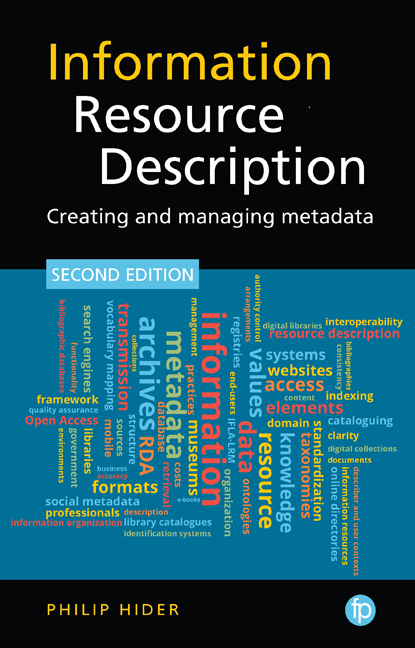Book contents
- Frontmatter
- Dedication
- Contents
- List of figures and tables
- Preface to the First Edition
- Preface to the Second Edition
- List of abbreviations
- 1 Definitions and scope
- 2 Information resource attributes
- 3 Tools and systems
- 4 Metadata sources
- 5 Metadata quality
- 6 Sharing metadata
- 7 Metadata standards
- 8 Vocabularies
- 9 The future of metadata
- Further reading
- List of metadata standards
- Index
7 - Metadata standards
Published online by Cambridge University Press: 24 September 2019
- Frontmatter
- Dedication
- Contents
- List of figures and tables
- Preface to the First Edition
- Preface to the Second Edition
- List of abbreviations
- 1 Definitions and scope
- 2 Information resource attributes
- 3 Tools and systems
- 4 Metadata sources
- 5 Metadata quality
- 6 Sharing metadata
- 7 Metadata standards
- 8 Vocabularies
- 9 The future of metadata
- Further reading
- List of metadata standards
- Index
Summary
Introduction
We have noted, in the preceding chapters, some of the benefits of applying various kinds of metadata standard. Their use can improve the consistency of resource description and facilitate the sharing of metadata; they can also assist with other aspects of metadata quality. A standard is more than a convention. It represents a practice that is prescribed, not simply what is normal. A standard may be aimed at staff inside a single organization (an inhouse standard) or at a much broader community of practice, perhaps at national or international level. In order for it to be promulgated, a standard is set out in some form of document. Sometimes this document may not explicitly claim the status of a standard but is nevertheless followed by a large number of practitioners, making it a de facto standard. Many of the standards applied by metadata specialists fall into this category. Other standards, however, may be the product of an extensive consultation process and are formally approved by a professional body or standards agency. On its website, the International Organization for Standardization (ISO) defines standards as ‘documented agreements containing technical specifications or other precise criteria to be used consistently as rules, guidelines, or definitions of characteristics, to ensure that materials, products, processes and services are fit for their purpose’.
Standards have been developed for all aspects of metadata, including its values, elements, format and transmission. Many standards cover more than one of these aspects. However, we shall leave those that primarily relate to values, such as the controlled vocabularies we mentioned in Chapter 5, for the next chapter. In this chapter we shall look at key standards pertaining to elements, format and transmission.
Metadata standards sometimes consist of little more than a list (e.g. of elements), but often they are considerably more detailed. They may, for instance, contain definitions, indicate relationships, specify circumstances of use, advise how a resource should be analysed or give options. The more detail, the greater the likelihood of consistency and quality metadata, although it also makes a standard more difficult and costly to apply.
There are, in fact, a wide range of factors that can influence the extent to which a metadata standard is adopted, including purpose, resource attributes, design, granularity, interoperability, support, growth, extensibility, repu - tation, ease of use and existing expertise (Kelly, 2006).
- Type
- Chapter
- Information
- Information Resource DescriptionCreating and Managing Metadata, pp. 123 - 174Publisher: FacetPrint publication year: 2018



